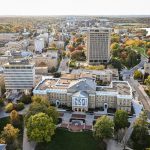Research in the News

Faculty receive 2024-25 WARF Named Professorships, Kellett Fellowships, and Romnes Awards
Thirty-two UW–Madison faculty have been awarded fellowships from the Office of the Vice Chancellor for Research for 2024-25. The awardees span the four research divisions on campus: arts and humanities, physical sciences, social sciences and biological sciences. “These awards recognize excellence in faculty research, academics, and outreach at various stages…
Dr. Dorota A. Grejner-Brzezińska named next Vice Chancellor for Research
Grejner-Brzezińska, Vice President for Knowledge Enterprise, a longtime Ohio State University Engineering Professor, and GPS researcher, begins her UW role on Sept. 1.
175th Anniversary Series: UW–Madison research spans the globe
The Wisconsin Idea has outgrown state borders and, as science has become more mobile, now stretches across the globe and even out of this world.
UW–Madison increases research expenditures by $16 million, retains top 10 research institution ranking
The National Science Foundation has released its 2021 fiscal year Higher Education Research and Development (HERD) data, and the University of Wisconsin–Madison has again ranked eighth in the national research rankings for public and private universities. UW–Madison ranked eighth in the last survey covering the 2020 fiscal year. The rankings are the first to include a full fiscal year reflecting pandemic impacts.
Faculty receive WARF Named Professorships, Kellett Fellowships, and Romnes Awards
Thirty-two members of the University of Wisconsin–Madison faculty have been awarded fellowships from the Office of the Vice Chancellor for Research and Graduate Education for 2022-23. The awardees span the four divisions on campus: arts and humanities, physical sciences, social sciences and biological sciences. “These awards provide an opportunity for campus to recognize our outstanding faculty,” says Steve Ackerman, vice chancellor for research and graduate education. “They highlight faculty efforts to support the research, teaching, outreach and public service missions of the university.”
UW–Madison retains top 10 research ranking, increases expenditures
The National Science Foundation has released its 2020 fiscal year Higher Education Research and Development (HERD) data and the University of Wisconsin–Madison has again ranked 8th in the national research rankings for public and private universities. UW–Madison ranked 8th in the last survey covering the 2019 fiscal year.
Faculty receive WARF Named Professorships, Kellett Fellowships, and Romnes Awards
Thirty-three members of the University of Wisconsin–Madison faculty have been awarded fellowships for 2021-22. The awardees span the four divisions on campus: arts and humanities, physical sciences, social sciences and biological sciences.
Celebrating IceCube’s first decade of discovery
It was the beginning of a grand experiment unlike anything the world had ever seen. Ten years ago today, the IceCube Neutrino Observatory fully opened its eyes for the first time. Over the course of the previous seven years, dozens of intrepid technicians, engineers, and scientists had traveled to the South Pole — one of the coldest, driest and most isolated places on Earth — to build the biggest, strangest telescope in the world. Crews drilled 86 holes nearly two-and-a-half kilometers deep and lowered a cable strung with 60 basketball-sized light detectors into each hole.
UW–Madison retains top 10 national research ranking
The National Science Foundation has released its 2019 fiscal year Higher Education Research and Development Survey, or HERD, data, showing that the University of Wisconsin–Madison ranked 8th place in the national research rankings for public and private universities. UW–Madison also ranked 8th in the last survey covering the 2018 fiscal year.
Celebrating 25 years of embryonic stem cell research at UW–Madison
It’s been 25 years since UW–Madison scientist James Thomson became the first in the world to successfully isolate and culture primate embryonic stem cells. He accomplished this breakthrough first with nonhuman primates at the Wisconsin National Primate Research Center in 1995, using rhesus monkey cells, then in 1996 with marmoset cells. Thomson then published his world-changing breakthrough on human embryonic stem cell derivation in Science on Nov. 6, 1998.
